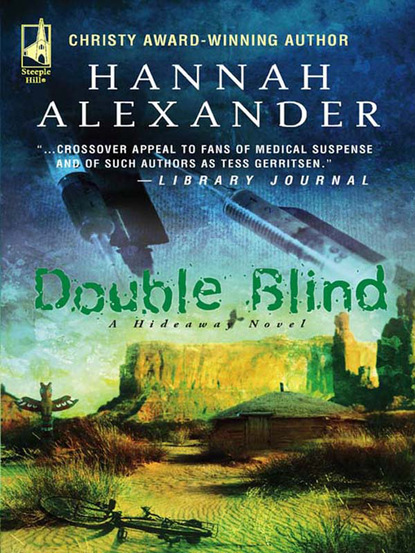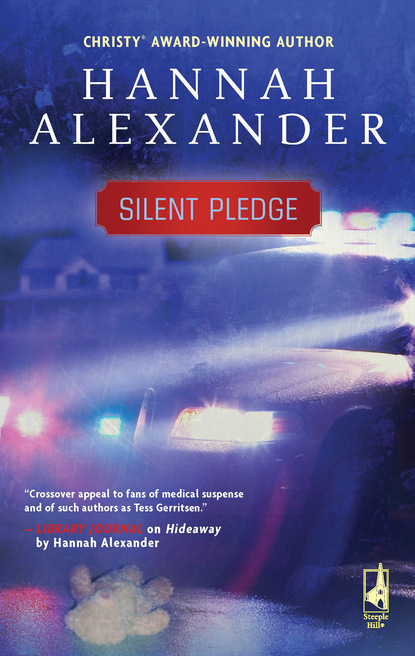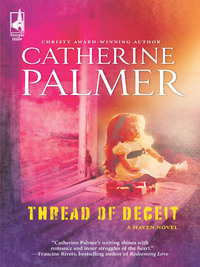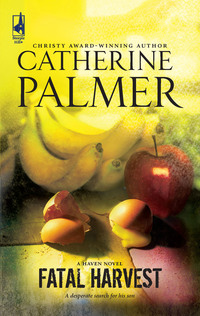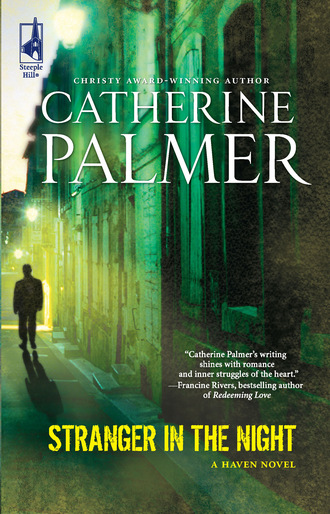
Полная версия
Stranger In The Night
Joshua was happy for his friend. He’d been too long without a woman in his own life, and he didn’t see much prospect for that changing anytime soon. Most of the girls at home were provincial. They believed everything they heard on television. Few had set foot outside the U. S. Some had never left Texas.
One or two women had caught Joshua’s eye while in Afghanistan, but a military romance was not for him. He enjoyed a lady who knew how the world functioned, but he didn’t want the separation or anxiety of such a relationship. He wouldn’t like to worry about safety. If he ever found love, he couldn’t risk losing it. So he had kept himself distant, focused on the task at hand.
“Ana’s not the only good thing in my life,” Sam said as they approached the stairwell. “We’ve got a lot to be thankful for around here. Lead paint abatement crews just finished stripping and recoating our walls. Ana wrote an article about the paint problem, and a surge of donations poured in. We formed a nonprofit organization—complete with a board of directors and grant writers. The bathrooms are finally working. The ramps, exits and stairwells meet code. It’s been a long haul.”
“The place looks good,” Joshua agreed.
“We’ve got new volunteers, too. Plus, the vet gave Duke an all-clear this morning. Hip dysplasia forced him out of police K-9 service too early, but he’s been God’s gift to us.”
“And this Pagandan family. Thanks to Haven, they’ll sleep safely tonight.”
“You’re the one who made that happen,” Sam said. “We’ve turned away people a lot more pitiful.”
“I’d never let a kid sleep on the streets. You wouldn’t, either, Hawke. You know it.”
As they began to climb the steps to the second floor, Charity and Virtue stretched tiny hands to pat the big dog. Joshua guessed the canine had been trained to sniff out drugs and could take down a grown man, but these small children sensed he wouldn’t harm them.
When Virtue sagged against the stairwell wall, Joshua lifted the tired boy into his arms. Sam scooped up the little girl.
“So Paganda has some big cities?” Terell was asking their father.
“One,” Stephen said. “But we come from a small village beside Lake Victoria. Our people were fishermen.”
“Were?” Terell frowned. “You mean they stopped?”
“Sir, the village was burned. My people…are not there now.”
Joshua silently prayed that Terell would take the hint. But subtlety was not the man’s strong suit.
“Headed for refugee camps, I’ll bet. Good thing you got your family out.”
“My children and I are three of only nine people who survived from my village.” Stephen paused in the stairwell, his voice growing low. “When my wife learned that the rebel army was coming, she placed these two—the youngest except for our baby—inside a metal water drum. There were only a few liters remaining inside it, and she put a padlock on the top. Because of rust, the drum had small holes. Through these, the air could come. When I returned to my house, I saw that the roof and walls had burned. Rebels had looted the furnishings. But God protected the drum. Inside it, I found my two children.”
As Stephen spoke the final words, a chill crawled up Joshua’s spine. The drowsy little boy whose head lolled against his shoulder had survived the destruction of his village because his mother had hidden him in a water drum? At their young ages, the kids might have drowned. The burning house could have caved in on top of them. They might have been discovered and killed. The child was a miracle.
“But where were you the whole time?” Terell asked Stephen as the group walked down a hall.
His grunt was bitter. “I was attending a pastors’ meeting in another town. When I heard news of the rebel attack, I rode my bicycle as fast as I could. But I arrived at my village too late.”
“So your baby? What…I mean…Where’s the baby?”
Shaking his head, Joshua realized that Tyrell had never seen the shell-shocked faces of civilians whose lives were destroyed by war and death. His own inability to shrug off nightmares and block memories of events he had witnessed showed how difficult it could be to recover from such trauma.
“My son, Justice, was killed,” Stephen said, the words muffled. “Also my first wife, Priscilla, and my other children, Purity, Hope, Fidelity and Honor. I would thank you, please, that we not discuss this subject further tonight, sir. By God’s grace, I still have Charity and Virtue. I must protect them from the memories of what they heard and saw.”
“Oh, yeah, my brother. We can drop that topic forever.” Terell looked shaken.
The group stepped into a small room outfitted with several beds and a table. Despite its rules, Haven had made provisions for just such an emergency as this.
“You’ve got clean sheets there,” Sam said. “We keep crackers and power bars on that shelf. Towels and soap are in the bathroom, along with paper drinking cups.”
“I could run out for some milk,” Terell offered. “I’d be glad to do it.”
“Water is most acceptable for us.” Stephen faced his benefactors. “May God bless you for your kindness.”
Joshua bent and gently laid the sleeping Virtue on one of the beds. He pulled a sheet and thin blanket over the child. Thumb thrust into his mouth, Virtue barely stirred. Charity, too, was sound asleep.
When he straightened, Joshua noted that Sam and Terell had left the room. Stephen was murmuring to his wife. It was time to leave the family in peace. Yet Joshua needed to speak.
“Excuse me,” he said. The two Pagandans fell silent as Joshua addressed Stephen. “You’re a pastor, then. A Christian.”
“I am, sir.”
Joshua hesitated a moment. “The pain and the loss you feel. The fear, too. I’ve known some of that. God takes care of it after a while. He uses it to make you better. Trust Him.”
Stephen swallowed, unable to meet the other man’s eyes. He nodded slightly, but did not otherwise respond.
“Good night,” Joshua said finally. “We’ll see you in the morning.”
He closed the door and started after Terell, who was questioning Sam as they walked to their shared room. “Did you hear what that guy said? Rebels killed his baby. His baby! That is just wrong. Those other names—were those his kids, too?”
“Yeah, and his wife,” Joshua said, catching up to them.
Sam frowned. “But his wife is with him.”
“Mary must be someone new. He said Priscilla was the mother of his children.”
Terell groaned. “Aw, man, the first wife must have gotten killed by the rebels. Sam, those two kids were locked in a barrel. They could have starved.”
“Or been slaughtered like their brothers and sisters. But they’re alive—that’s the important thing.”
Joshua nodded. “Now the family has to figure out a way to move ahead without the past dragging them down. Like all of us.”
He could feel Terell’s eyes on him as they entered the room. “You think the kids heard their mama being murdered?”
“Maybe. They know she’s dead.”
“That’s terrible, yo. If anybody went after my mama, I’d kill him.”
“Good job. You just described the basic recipe for genocide.” Joshua stretched out on the cot. “Revenge never did anyone a bit of good.”
Sam dropped down onto his bed. “Let it go, Terell.”
“You dudes don’t have any feelings. I can’t hear a story like that and then let it go. Those are my people.”
Sam gave a snort as he switched off the lamp. “They’re not your people any more than they’re mine.”
“They’re black. Africans are my ancestors.”
“And my great-great-grandfather was a Scottish laird. You don’t see me playing bagpipes and dancing a jig.”
Joshua knew he should let the two men hash it out, but he couldn’t resist offering his thoughts. “We’re all connected. Forget skin color and bloodlines. God doesn’t see that. Neither should we.”
“Haven may not have room for everyone,” Sam said. “But we’re here to help the Rudi family. If his wife’s killers walked in here, we’d probably help them, too. Get over yourself, Terell.”
“Me? You’re both loony tunes. The sand in your heads rusted out your brains. Go find a couple of camels, yo. Get on back to the desert where you belong.”
Joshua could hear Sam chuckling. A comforting sound. In a moment, both men began to snore.
Joshua stroked the warm steel blade in his palm. Turning onto his stomach, he slipped the knife under his pillow. It might just come in handy.
Chapter Two
L iz locked her purse inside the drawer under her desk and switched on the computer. She was tired. Too tired to be at work this early in the morning. But the day wouldn’t wait.
Before meeting a Somali family at the airport at ten, she had to fill out status reports on two groups of Burmese immigrants brought in by Refugee Hope. They had landed in St. Louis the week before. Ragged, little more than skin and bones, they had stared at her with gaunt faces and milky eyes. At the sight of an energetic white woman with a mass of brunette curls, the children clung to each other. Their parents couldn’t quite muster a smile at having finally arrived in America, the land of their dreams.
With a sigh, Liz shook her head.
“Incoming!” Her closest friend at the agency breezed past the small cubicle. Molly stuck a thumb behind her to indicate the cluster of people headed Liz’s way. “They’re all yours!”
Molly loved mornings.
Liz groaned and reached for her flask of hot tea. Before work, she always steeped a pot of the strongest black tea on the market. The first cup opened her eyes. The second turned on her brain. With the third, she usually had the gumption to say—
“No.” Holding up a palm, Liz rose from her chair before the newcomers could step into her cubicle. “I don’t know who sent you here, but you have the wrong office.”
“No?” A tall man with close-cropped brown hair stepped around the collection of bewildered Africans. His dark eyebrows narrowed. “Did you say no?”
“I’m sorry, but this is not one of my families.” She met his blue eyes. Deep navy with white flecks, they stared straight into her.
Why hadn’t she started that third cup on the drive to work?
“I know my own people,” she informed him. “This group doesn’t belong to me. If you’ll go back to the front office—”
“The front office sent us to you.” Gaze unwavering, he stuck out a hand. “Sergeant Joshua Duff, U. S. Marine Corps. And you are?”
“Liz.” She grasped the hand. His warm fingers curled around her palm, crushing her knuckles together. She caught her breath. “Liz Wallace.”
“A Scot. I’m Irish.”
“American, actually.” She pulled her hand away and stuck it in the pocket of her slacks. “So, Semper Fi and all that. I appreciate the interest you’ve taken in these people, Sergeant, but Refugee Hope is accountable only for the families we relocate. If you’re responsible for this group, you’ll have to—”
“Semper Fi and all that?” He leaned forward, as if he weren’t sure he heard her correctly.
Oh, great, Liz thought. She picked up her flask, unscrewed the lid and poured the third cup. Praying he couldn’t see her hand trembling, she lifted the mug to her lips. The tea slid down her throat.
This was not what she needed a few minutes after eight in the morning. Not an overwhelming, overbearing, overly handsome sergeant with a death grip. And certainly not a pair of striking blue eyes that never seemed to blink.
“Sergeant Duff.” She found a smile and hoped it looked sincere. “Please forgive my lack of courtesy. I have a large number of families in my caseload. An overwhelming number. This group isn’t among them.”
With effort, she dragged her focus from the man’s sculpted cheekbones and clean-shaven square jaw. The group huddled under his protection shrank into each other as she assessed them. A man, midforties, she guessed. His wife, hard to tell her age behind those big glasses, clearly traumatized. Two children. The girl, about seven, needing new clothes. The boy, probably five, missing several front teeth.
“This is Reverend Stephen Rudi,” Sergeant Duff said, clamping his big hand on the man’s shoulder. “His wife, Mary. Their children, Charity and Virtue. They’re from Paganda.”
Paganda. Images flashed into Liz’s mind. Photographs she’d seen. Villages burning. Mass graves. Boy soldiers toting machine guns. She thought of the people she had met in Congo. They spoke of Paganda in hushed tones. Even worse than most places, they said. Genocide. A bloodbath.
Liz shuddered and sized up the little family more closely. Who knew what these people had endured? Too often these days, she caught herself regarding the refugees as line items on one of her many lists. Family from Burundi: mother, father, eight children. Family from Bosnia: mother, her brother, four children. Family from Ivory Coast: mother (pregnant), father, six children.
When had they ceased to be human beings?
“Reverend Rudi, good morning.” Liz offered her welcome in the African way—right hand extended, left hand placed on the opposite arm near the crook of the elbow. A demonstration of honor, as if to say, “I will not greet you with one hand and stab you with the other.”
The man stepped forward, shook her hand and made a little bow. “Good morning, madam. Thank you very much for your time. My family is in great need of assistance.”
How often had she heard these words, Liz wondered. The need was a pit, bottomless and gaping. A hungry mouth, never sated.
“Which agency brought you to St. Louis?” she asked him. It was a relief to turn her attention from Sergeant Duff. Like a male lion poised to spring, the man didn’t budge. His presence filled the cubicle with a sort of expectant energy Liz could hardly ignore.
Reverend Rudi’s voice was strained but warm, carrying familiar ministerial overtones. “Madam, Global Care brought my family from a refugee camp in Kenya. We traveled by airplane from Nairobi to Atlanta. My wife’s brother invited us to St. Louis.”
“Global Care doesn’t have an office here,” Duff inserted. “The Rudis will need your help.”
Liz returned her focus to his face. The man had moved closer to her desk now, his fingertips touching her stack of files, his shoulder tilted in her direction.
“I’m sorry, Sergeant. As I said before, if Refugee Hope didn’t bring this family to the States, we won’t be able to provide assistance. The Rudis need to contact Global Care in Atlanta and make arrangements.”
“But as you see, they’re here now. So what can you do for them?”
“Nothing. I’m authorized to work only with my families. Those brought in by Refugee Hope.”
“So transfer them.”
She studied the blue eyes. He really did expect her to obey. He thought she would capitulate right on the spot. The man was used to giving orders, and to having them followed.
Liz had never done well with authority figures. She simply didn’t buckle.
“If Global Care wants to make provisions for this family,” she informed him, “you will need to speak to someone at their headquarters in Atlanta. Refugee Hope is based in Washington, D. C. St. Louis is a resettlement point. We follow our agency’s rules.”
Joshua Duff straightened. His eyes narrowed. Then he turned to the family. “Pastor Stephen, how about you go find a snack machine and get the kids something to eat.”
He fished a wallet from his pocket. Liz tried not to gawk at an accordion of cash that unfolded when he opened it. He removed several bills and held them out. The African minister took the money with some reluctance. Duff misunderstood.
“Snack machine.” He motioned as if he were pushing buttons with his index finger. “Food. Candy bars. Crackers.”
With a nod, Reverend Rudi shepherded his little flock out of the cubicle. The moment they were out of sight, Duff leaned into her desk.
“Listen, ma’am, I came across this family last night. I agreed to help them. You work for a refugee agency, right? These are refugees. So do your job.”
Liz stepped around her desk. “This is not the Marine Corps, Sergeant. But we do have a protocol and you’re asking me to violate it. I will not do that.”
The dark eyebrows lifted. “All right, I understand. So, what do we have to do to make this happen?”
“I’ve told you. Call Global Care and turn the family over to them.”
“And where is that pitiful bunch supposed to go while the agency figures out what to do with them?”
“You could put them on a bus and send them back to Atlanta.”
“They don’t want to live in Atlanta. They want to stay here and look for the lady’s brother.” He set one hip on her desk, bringing himself down to her eye level. “Ms. Wallace, you wouldn’t be working for this agency if you didn’t have compassion. These folks need a place to stay, decent jobs, a way to get around. That’s what you do, isn’t it? Why don’t you just help them out of the goodness of your heart?”
“Why don’t you? ”
“Because I live in Texas.”
He looked away, the muscle in his jaw flickering. Liz could see the man was struggling for control. Good. She had a full day of work ahead, and she didn’t like being pushed around.
In a moment, he faced her again. “Look, I’ve just spent seven months hunting insurgents in the Afghan mountains. My third deployment. I’m tired. My patience—never a strong suit—is wearing real thin right now. I came to St. Louis to visit a friend for a couple of days, and this morning he sent me out on a little mercy mission on behalf of Reverend Rudi and his family. Now, they’re nice folks, and they’ve been through an ordeal worse than most. I believe you know exactly how to arrange a happy American life for them, ma’am. Am I wrong about that?”
“I know how to resettle refugees, yes. But as I said, I’m not allowed to work with families who aren’t on my list. If you’re so worried, you help them. It’s time-consuming but not all that complicated. I’ll tell you what to do step by step. How does that sound?”
He bent his head and chuckled. “Well, well, well. You know something, Liz Wallace? You’re more trouble than a couple of Pashtuns haggling over the price of a camel. I can handle them. I can track a sniper across five miles of bare rock. I can even talk a sheikh into turning loose a few goats to feed some hungry beggars. But I can’t seem to get a social worker to help a family of refugees. Did I catch you on a bad day, or are you always this mean?”
Liz rolled her eyes. “Move. You’ve got your Duff on my files, Sergeant.”
With a laugh of disbelief, he stood. Liz scooped up her paperwork and flipped open the first file.
“You see this family?” she said, covering the name with her thumb. The photographs of four Somalis were lined up along one side. They looked like criminals posing for mug shots.
“This mother was raped by guerrilla soldiers. Seven of them. In front of her husband and children. They killed the father, the baby and the other two youngest of her five kids. Chopped them up with machetes. They took the oldest girl, raped her, tied her legs and arms together and then threw her into the back of their truck. They took the oldest boy as a slave. Then they drove away.”
She paused and glanced at Duff. His grim expression told Liz she was getting through.
“The mother never saw her children again,” she continued. “She was left with one daughter, a thirteen-year-old who had been fetching water from a stream when the rebels attacked. This woman and her daughter walked more than a hundred miles across the Somali desert into Kenya. They lived in a mud hut inside a United Nations refugee camp for five years. They ate gruel and got water from a spigot that served twenty other families. Both gave birth to sons. This mother, her daughter, son and grandson are here now. In St. Louis. Are you with me, Sergeant?”
“All the way.”
“Shall I continue?”
“Go ahead.” His face had grown solemn, but his eyes were not focused on the photographs. He was looking at Liz.
Disconcerted, she closed the file and set it back on her desk before speaking again.
“Two weeks ago, I greeted this woman and her family at the airport, Sergeant Duff. I took them to a run-down apartment in a high-rise not far from here. Refugee Hope has prepaid their rent for three months. Within those three months, it’s my job to make sure this mother learns how to use public transportation, goes to English language classes and attends job training. I have three months to enroll the daughter in a school where no one speaks her language and yet see that she’s able to cope. Three months to ensure that the two babies are brought back to health and provided with adequate day care. I have three months’ worth of funds with which to buy food and clothing. If this family isn’t successfully working, attending school, living independently and eating with proper nutrition in three months, I haven’t done my duty, Sergeant Duff. They’ll be cut loose from Refugee Hope, and no one will follow me to pick up the pieces.”
She looked into his eyes. The bluster was gone, and in its place, she saw a deep sympathy. A warmth. So unexpected she felt her heart stumble.
“How many families do you have, ma’am?”
“Twenty-three current groups. If I don’t get some work done at my desk this morning, I’ll be late to pick up family number twenty-four at Lambert. And you can call me Liz.”
“Liz.” He was silent for a moment. “I live in Amarillo, Liz. That’s a long way off.”
“But see, the Rudi family is here now.” She repeated what he had said to her earlier. “So what can you do for them?”
“You’re good. You’ve trapped me.”
“I can’t track a sniper over bare rock, but I’m not stupid. You wouldn’t have brought those people here if you didn’t have a compassionate streak. We’re alike in that way. Let me tell you how to help them, Sergeant.”
“You can call me Joshua.”
“You’ll enjoy lending a hand, Joshua. Lots more fun than dealing with squabbling sheikhs.”
He opened his mouth to answer, but the return of Reverend Rudi and his family silenced the Marine.
Charity and Virtue, it became evident, had discovered Cheetos. Their lips and fingers coated with orange dust, the two children sidled into the cubicle. Liz struggled not to laugh and scoop them up into her arms, as she so often did with the precious little ones who came under her wings of care. But she couldn’t afford to melt. Not now.
Sergeant Duff needed to take responsibility for this family. His wad of cash would surely buy bus tickets back to Atlanta. He was a good man, kind and concerned. But he had just returned from the war, and his home was in Texas. The last thing he would want to do was take on a group of Pagandans.
“What’ve you got there?” he asked, hunkering down in front of Virtue. “Let me see those fingers, kiddo.”
The child glanced up at his father. Pastor Stephen said something in their native tongue, and Virtue held out his hands. When he noticed his orange fingers, the boy gasped and then burst into a gale of giggles. His sister looked at her hands and started laughing, too.
“Cheetos,” Duff informed the pair. “Puffed or fried, can’t beat ’em. My favorite.”
He rubbed his stomach and made smacking sounds. The kids joined in, rubbing and smacking, clearly enjoying a moment of silliness in the midst of such a solemn day. Pastor Stephen held up the empty cellophane bag.
“The food is very…pink,” he told Liz. “Pardon me…orange. Yes, orange. Can it be washed?”
“Certainly,” she told him. “There’s a bathroom down the hall. You can stop by on your way out. I believe Sergeant Duff is going to help you contact Global Care and make sure you’re safely on your way back to Atlanta.”
“Am I?” Joshua stood, again filling the cubicle in a manner that seemed to dwarf everyone else in the tiny space. “I don’t remember telling you that, Ms. Wallace.”
“Liz. And I told you I couldn’t help them.”
“But you said you’d help me. You’ll tell me the steps, and I’ll settle the family here. Right?”
She couldn’t believe she had heard the man correctly. People didn’t do this. Volunteers might take a few hours out of their lives to assist refugees. A church might adopt a family or two. But no one dropped everything. No one single person simply gave up the weeks and months it took to acclimate an entire group. Liz was paid, and even she had to rely on other aid workers and volunteer helpers.


